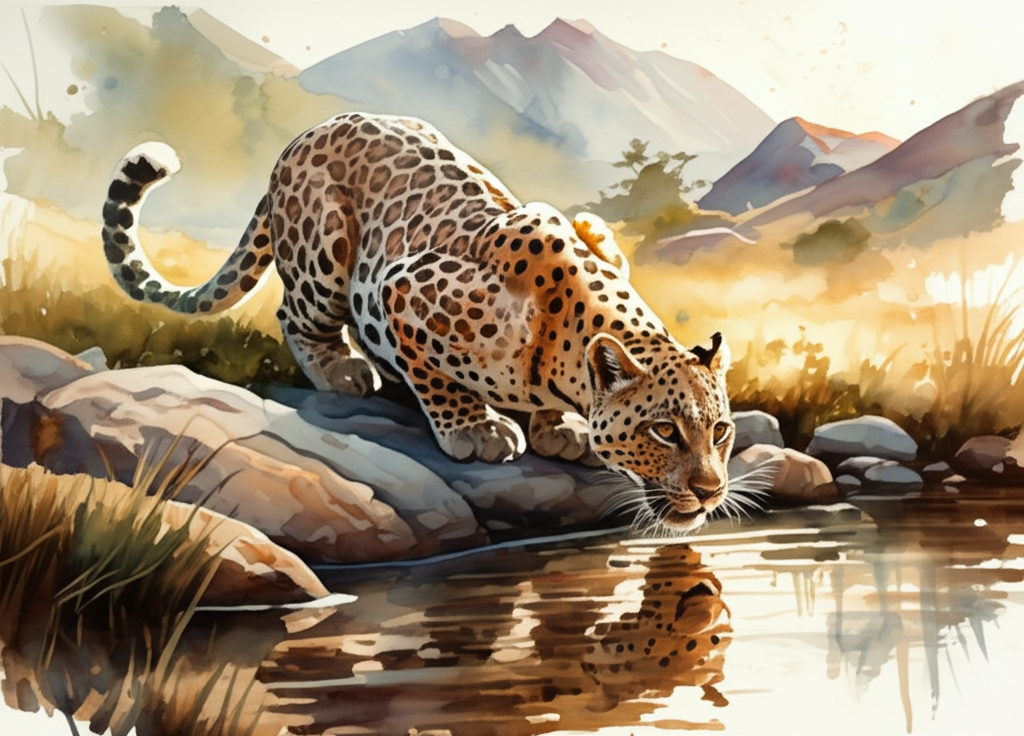
A leopard, strong and graceful, was drinking from the mountain stream. Then, it laid down on the grass to enjoy the warm sunshine. Its tail wiggled a little, and it looked like it was sleeping. When it heard voices far away, it lifted its head to listen. Then, it stood up and jumped easily over the rocks in the stream, disappearing into the trees on the other side.
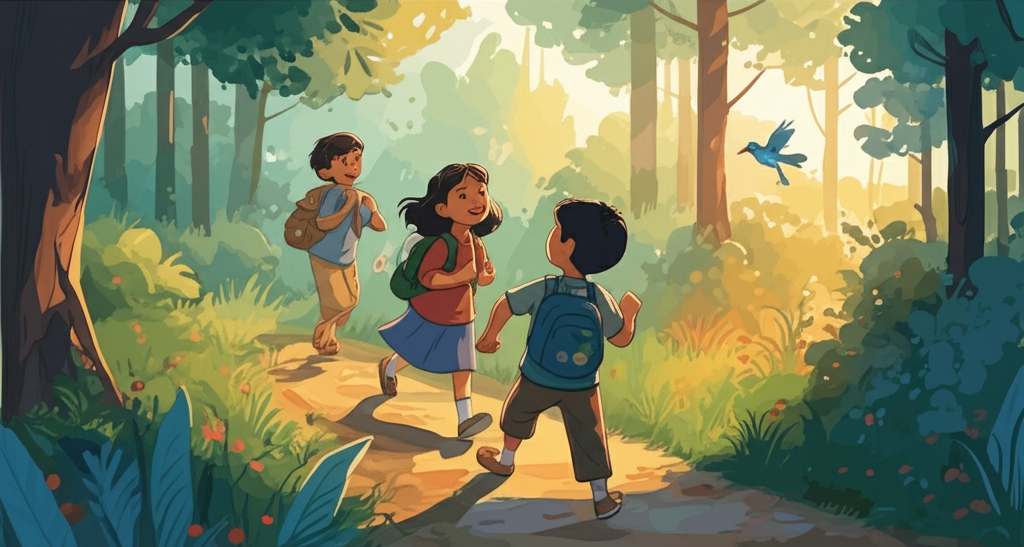
A minute or two later, three kids came walking down the forest path. There was a girl and two boys, and they were singing a fun old song that their grandparents had taught them.
Five more miles to go! We climb through rain and snow. A river to cross… A mountain to pass… Now we’ve four more miles to go!
Their backpacks looked brand new, and their clothes were clean and ironed. Their loud and happy singing surprised a little bird. The bird flew away from its favorite rock in the stream and into the dark valley.
‘Okay, we only have three more miles to go,’ said the older boy, Prakash, who had walked this way many, many times. ‘But first, we have to cross the stream.’
He was a strong twelve-year-old with bright eyes and lots of hair that wouldn’t stay flat on his head. The girl and her little brother were walking this path for the very first time.
‘I’m tired, Bina,’ said the little boy.
Bina smiled at him, and Prakash said, ‘Don’t worry, Sonu, you’ll get used to the walk. We have lots of time.’ He looked at the old watch that his grandpa gave him. He had to wind it up all the time. ‘We can rest here for five or six minutes.’
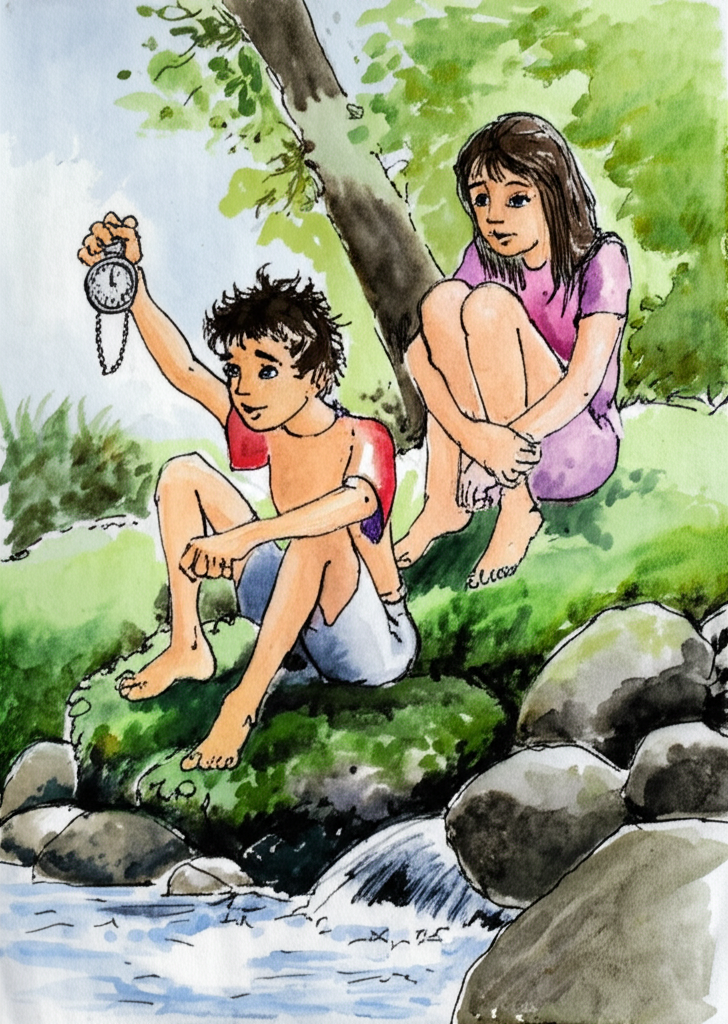
They sat down on a smooth rock and watched the clear water flowing down the hill. Bina looked closely at the old watch on Prakash’s wrist. The glass was scratched, and it was hard to see the numbers. ‘Are you sure it still tells the right time?’ she asked.
‘Well, it loses five minutes every day, so I set it ten minutes ahead at night. That means it’s pretty close in the morning! Even our teacher, Mr. Mani, asks me for the time. If he doesn’t ask, I tell him anyway! The clock in our classroom always stops.’
They took off their shoes and let the cold mountain water run over their feet. Bina was the same age as Prakash. She had rosy cheeks, gentle brown eyes, and hair that was starting to get less curly. She had a sweet face, but a strong chin showed that she could be very brave.
Sonu, her little brother, was ten. He was a skinny boy who had been sick a lot when he was younger, but now he was starting to get bigger. Even though he didn’t look like a super athlete, he could run super fast!
Bina used to go to school in her own village, Koli, on the other side of the mountain. But that school only went up to fifth grade. Now, to go to sixth grade, she would have to walk several miles every day to Nauti, where there was a school that went up to eighth grade. They decided that Sonu would go to the new school too, so Bina wouldn’t be alone. Prakash, their neighbor in Koli, already went to the school in Nauti. He was a little mischievous, which sometimes got him in trouble, and that’s why he was repeating a grade.
But he didn’t seem to care. ‘What’s the rush?’ he had told his upset parents. ‘You’re not sending me to another country when I finish school. And our cows aren’t running away, are they?’
‘You’d rather take care of the cows, wouldn’t you?’ asked Bina as they stood up to keep walking.
‘Oh, school’s okay. Wait till you meet old Mr. Mani. He always gets our names mixed up, and the subjects he’s supposed to be teaching. Last lesson, instead of math, he taught us about geography!’
‘More fun than math,’ said Bina.
‘Yeah, but there’s a new teacher this year. They say she’s very young, just out of college. I wonder what she’ll be like.’
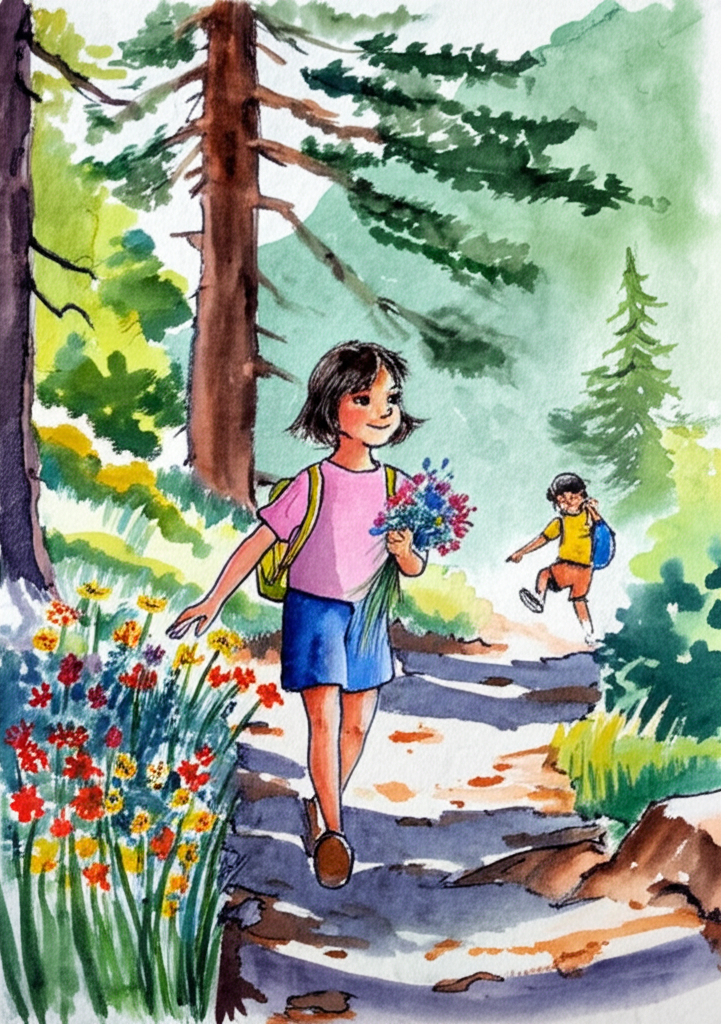
Bina walked faster, and Sonu had trouble keeping up. She was excited about the new school and seeing new things. She had hardly ever left her own village, with its small school and one little store. Every day was the same – helping her mom in the fields or with chores like getting water from the spring or cutting grass for the animals. Her dad was a soldier, and he was away for nine months every year. Sonu was too young for the harder chores.
As they got closer to Nauti village, other kids joined them from different directions. Even though there weren’t big roads, the mountains had lots of small paths and shortcuts. Like a game of snakes and ladders, these little paths went around the hills and villages, through fields, and across valleys until they all came together into a road where mules, cows, and goats walked along with everyone else.
Nauti was a pretty big village, and from there, a wider, dusty road went to Tehri. There was a small bus, some trucks, and a road roller for part of the way. The road wasn’t finished because the heavy road roller couldn’t climb the steep hill to Nauti. It was parked on the side of the road halfway up from Tehri.
Prakash knew almost everyone in the area and said hello and talked to other kids, mule drivers, bus drivers, milkmen, and road workers. He loved telling everyone the time, even if they didn’t care.
‘It’s nine o’clock,’ he would say, looking at his wrist. ‘Isn’t your bus leaving today?’
‘Go away!’ the bus driver would say. ‘I’ll leave when I’m ready.’
As the kids got close to Nauti, they could see the small school buildings on the edge of the village, with tall pine trees all around. There were lots of people gathered on the playing field. Something strange must have happened. Prakash ran ahead to see what was going on. Bina and Sonu stood in a sunny spot near the wall.
Prakash ran back to them, super excited.
‘It’s Mr. Mani!’ he said, out of breath. ‘He’s gone! People are saying a leopard must have taken him!’
Mr. Mani wasn’t really old. He was about fifty-five, and he was going to retire soon. But to kids, adults over forty seemed ancient! And Mr. Mani had always been a little forgetful, even when he was young.
He had gone for his early morning walk and said he’d be back by eight o’clock to eat breakfast and get ready for class. He wasn’t married, but his sister and her husband lived with him. When it was after nine o’clock, his sister thought he had stopped at a neighbor’s house for breakfast (he loved eating other people’s food) and then gone to school. But when the school bell rang at ten o’clock, and everyone was there except for Mr. Mani, people started asking questions and guessing what happened.
No one had seen him come back from his walk, and when they asked around the village, they found out that he hadn’t stopped at anyone’s house. It was weird for Mr. Mani to disappear; it was super weird for him to disappear without eating breakfast.
Then, a milkman who was coming back from the next village said he had seen a leopard sitting on a rock near the pine forest. People had been talking about a leopard killing cows in the valley and about animals losing their homes because of a new dam. But no one had ever heard of a leopard attacking a person. Could Mr. Mani be its first victim? Someone found a piece of red cloth stuck in a berry bush and ran through the village, showing it to everyone. Mr. Mani was known to wear red pajama pants. Had he been grabbed and eaten? But where was the rest of him? And why would he be wearing his pajamas?
Meanwhile, Bina, Sonu, and the other kids had followed their teachers to the school playground. Feeling a little lost, Bina looked around for Prakash. She saw a slim young woman with glasses, who looked like she was in her early twenties – a little too old to be a student. She had a kind face, and she seemed worried about everything that was happening.
Bina noticed that she had beautiful hands. It was clear that the new teacher hadn’t milked cows or worked in the fields!
‘You must be new here,’ said the teacher, smiling at Bina. ‘And is this your little brother?’
‘Yes, we’re from Koli village. We went to school there.’
‘It’s a long walk from Koli. You didn’t see any leopards, did you? Well, I’m new too. Are you in sixth grade?’
‘Sonu is in third grade. I’m in sixth.’
‘Then I’m your new teacher. My name is Tania Ramola. Come on, let’s go to our classroom.’
Mr. Mani showed up at twelve o’clock, wondering what all the fuss was about. No, he said, he hadn’t been attacked by a leopard; and yes, he had lost his pajama pants, and could someone please give them back?
‘How did you lose your pajama pants, Sir?’ asked Prakash.
‘They blew off the clothesline!’ said Mr. Mani.
After lots of questions, Mr. Mani admitted that he had walked further than he meant to and that he had gotten lost on the way back. He was a little upset because the new teacher had been put in charge of sixth grade, while he was still with fifth grade, along with that troublemaker Prakash, who kept telling him the time! The principal had explained that since Mr. Mani was going to retire at the end of the year, the school didn’t want to give him a senior class. But Mr. Mani thought it was a plan to get rid of him. He glared at Miss Ramola whenever he saw her. And when she smiled back, he looked away!
Mr. Mani had been getting even more forgetful lately – putting on his shoes without socks, wearing his vest inside out, mixing up people’s names, and, of course, eating other people’s lunches and dinners. His sister had made a special soup for the mailman, who was sick, and had asked Mr. Mani to take it to him in a thermos. When the mailman opened the thermos, there were only a few drops of soup left at the bottom. Mr. Mani had drunk the rest somewhere along the way.
When Mr. Mani talked about retiring, he always talked about his plans for the small field behind his house. Right now, it was full of potatoes, which didn’t need much care. But he wanted to grow pretty flowers.
The next time he went to Tehri, he promised himself he would buy some flower bulbs. The rainy season would be a good time to plant them. And until then, his potatoes were doing just fine.
Bina liked her first day at the new school. She felt comfortable with Miss Ramola, and so did most of the kids in her class. Tania Ramola had been to big cities like Delhi and Lucknow – places they had only read about – and they said she had a brother who was a pilot and flew planes all over the world. Maybe he’d fly over Nauti someday!
Most of the kids had seen planes flying overhead, but none of them had ever seen a ship, and only a few had been on a train. Tehri mountain was far from the train tracks and hundreds of miles from the ocean. But they all knew about the big dam being built at Tehri, just forty miles away.
Bina, Sonu, and Prakash walked part of the way home with some other kids, but then everyone went their own way. Once they crossed the stream, they were alone again.
It was a steep climb back to their village. Prakash had some peanuts, and he shared them with Bina and Sonu. At a little spring, they drank some water.
When they were less than a mile from home, they met a mailman who had finished delivering mail in the area and was going back to Nauti.
‘Don’t waste time on the way,’ he told them. ‘Try to get home before dark.’
‘What’s the rush?’ asked Prakash, looking at his watch. ‘It’s only five o’clock.’
‘There’s a leopard around. I saw it this morning, not far from the stream. No one knows how it got here. So don’t take any chances. Go home early.’
‘So there really is a leopard,’ said Sonu.
They listened to him and walked faster, and Sonu forgot to complain about his sore feet.
They got home well before sunset.
There was a smell of cooking in the air, and they were hungry.
‘Cabbage and roti,’ said Prakash sadly. ‘But I could eat anything today.’ He stopped outside his small house, and Bina and Sonu waved goodbye. Then, they walked across some fields to their small stone house.
‘Stuffed tomatoes,’ said Sonu, sniffing outside the front door.
‘And lemon pickle,’ said Bina, who had helped make it last month.
Their mom was lighting the kitchen stove. They hugged her and asked for dinner right away. She was a good cook who could make simple food taste amazing. Her favorite saying was, ‘Home-made soup is better than fancy food,’ and Bina and Sonu agreed.
They didn’t have electricity in their village, so they ate by the light of a lamp. After dinner, Sonu did some homework, while Bina went outside to look at the stars.
Across the fields, someone was playing a flute. ‘It must be Prakash,’ thought Bina. ‘He always messes up the high notes.’ But the flute music was sweet, and she started singing softly in the dark.
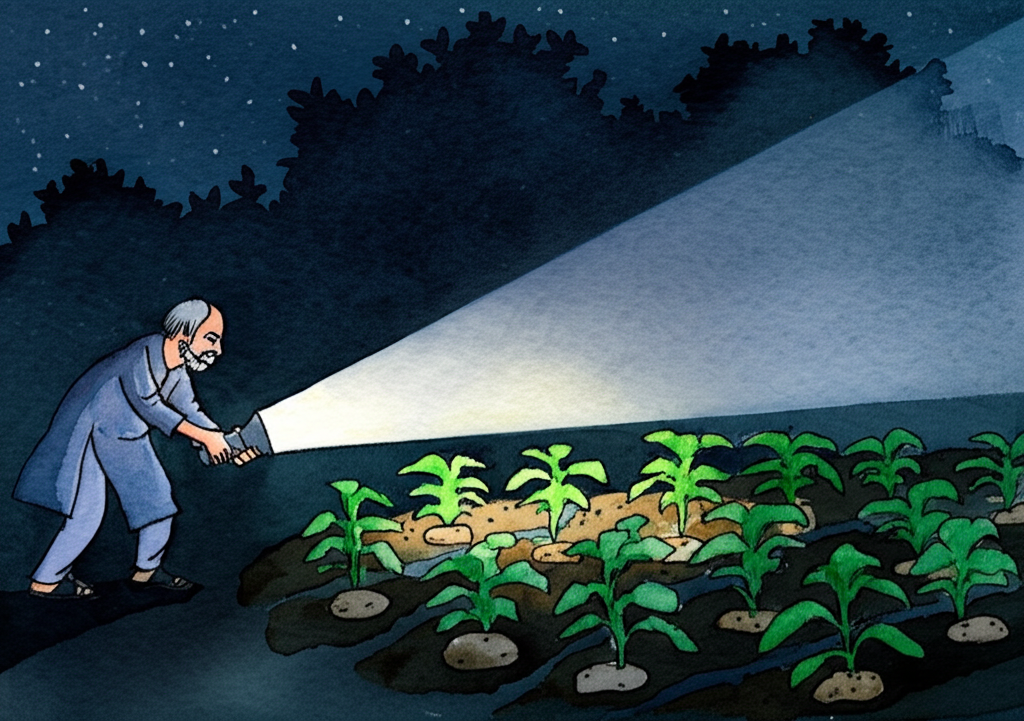
Mr. Mani was having trouble with porcupines. They were getting into his garden at night and eating his potatoes. From his bedroom window – which he left open now that the weather was nice – he could hear them enjoying the food he had worked so hard to grow. Crunch, crunch! They were using their sharp teeth to slice through the biggest, juiciest potatoes. To Mr. Mani, it felt like they were biting through his own skin. And the sound of them digging up his plants made him angry.
It wasn’t fair!
Mr. Mani hated porcupines. He wished they would disappear forever. But his friends said, ‘Animals deserve to live too,’ and besides, you could never see the porcupines or catch them. They only came out at night.
Mr. Mani got out of bed every night, with a flashlight in one hand and a stick in the other. But as soon as he stepped into the garden, the crunching and digging stopped, and everything was quiet. He would search around in the dark, swinging the stick, but he couldn’t see or hear a single porcupine. As soon as he got back in bed – the sounds would start again. Crunch, crunch…
Mr. Mani came to class tired and grumpy, with dark circles under his eyes. It took his students a while to figure out why he was so sad, but when they did, they felt bad for him and talked about how to save his potatoes from the porcupines.
Prakash had the idea of digging a water ditch. ‘Porcupines don’t like water,’ he said.
‘How do you know?’ asked one of his friends.
‘Throw water on one and see how it runs away! They don’t like getting wet.’
No one could say that Prakash was wrong, so the class decided to build a ditch. That meant they would get out of class for the day!
‘Anything to make Mr. Mani happy,’ said the principal. The rest of the school watched as the fifth graders, with shovels from all over the village, started digging a ditch around Mr. Mani’s potato field.
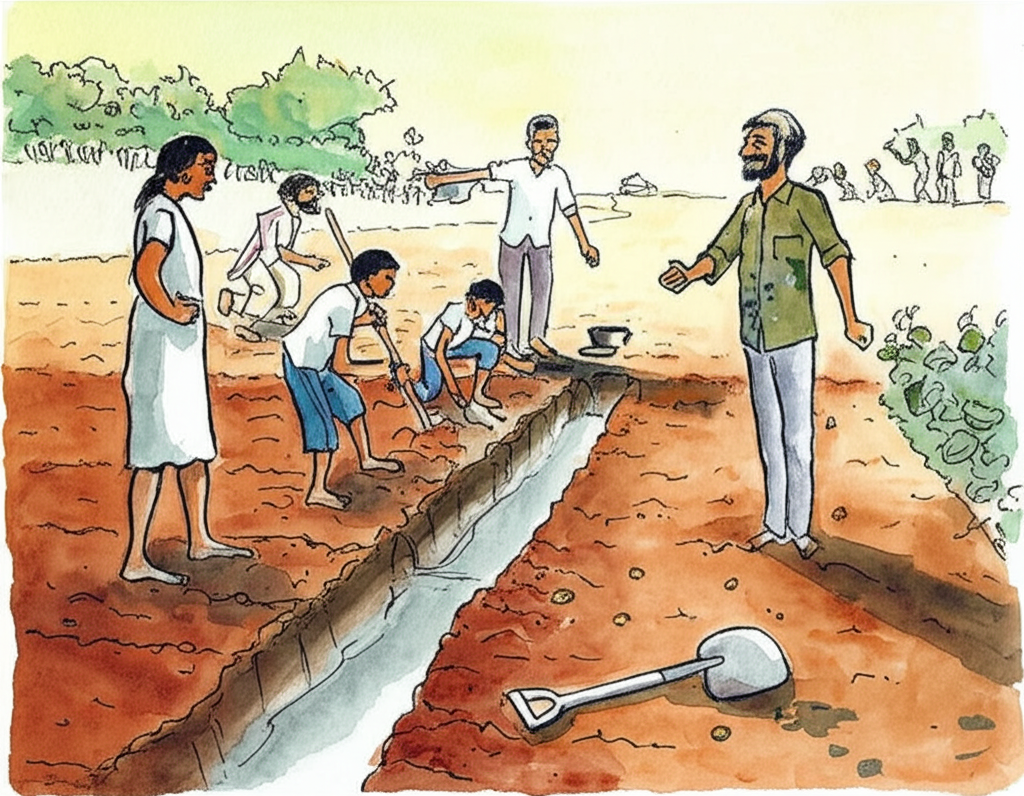
By evening, the ditch was ready, but it was still dry. The porcupines got in again that night and had a great feast.
‘If this keeps up,’ said Mr. Mani, ‘I won’t have any potatoes left.’
But the next day, Prakash and the other kids got water from a stream and filled the ditch. They were happy to watch the water flow in. Everyone went home in a good mood. By nightfall, the ditch was overflowing, and the potato field was flooded. Mr. Mani was stuck inside his house. But Prakash and his friends had won. The porcupines stayed away that night!
A month had gone by, and wildflowers were all over the hills. On her way to school, Bina picked some to make a little bouquet. The flowers fit perfectly in an old ink bottle. Miss Ramola was happy to see them on her desk.
‘Who put these here?’ she asked, surprised.
Bina didn’t say anything, and the rest of the class smiled. After that, they took turns bringing flowers for the classroom.
On her walks to school and home, Bina noticed that the trees were growing new leaves. The leaves were bright green on top and silvery underneath, and when the wind blew, they looked like clouds of silver and green. The path was covered with old, dry leaves. Sonu loved to kick them around.
Clouds of butterflies flew across the stream. Sonu was chasing a butterfly when he tripped over something dark. He fell on the grass. When he stood up, he looked down at the remains of a small animal.
‘Bina! Prakash! Come quick!’ he shouted.
It was part of a sheep, killed a few days earlier by a big animal.
‘Only a leopard could have done this,’ said Prakash.
‘Let’s get away, then,’ said Sonu. ‘It might still be around!’
‘No, there’s nothing left to eat. The leopard will be hunting somewhere else by now. Maybe it’s moved to the next valley.’
‘Still, I’m scared,’ said Sonu. ‘There may be more leopards!’
Bina took his hand. ‘Leopards don’t attack people!’ she said.
‘They will if they like the taste of people!’ said Prakash.
‘Well, this one hasn’t attacked anyone yet,’ said Bina, even though she wasn’t sure. Hadn’t she heard that a leopard attacked some workers near the dam? But she didn’t want Sonu to be scared, so she didn’t say anything. She just said, ‘It’s probably here because of all the people near the dam.’
Still, they hurried home. And for a few days, whenever they got to the stream, they crossed it quickly.
A few days later, the school went to Tehri to see the new dam being built.
Miss Ramola took her class, and Mr. Mani took his class too. That meant about fifty kids were going. The little bus could only hold thirty. A nice truck driver said he would take some kids if they sat on sacks of potatoes. And Prakash got the owner of the road roller to turn it around and drive it back to Tehri, with him and a couple of friends up front.
Prakash’s group left early, because they had to walk a long way to get to the road roller. The bus left at 9 a.m. with Miss Ramola and her class, and Mr. Mani and some of his students. The truck would follow later.
It was Bina’s first time visiting a big town and riding on a bus.
The sharp turns on the winding road made some kids feel sick. The bus driver was driving super fast. He took them along at a bumpy speed, which made Bina feel dizzy. She put her head down and didn’t look out the window. Sharp turns and cliffs, pine forests and snowy mountains all rushed past her, but she felt too sick to look at anything. That was probably a good thing – the cliffs were very high and scary.
Bina wished she hadn’t come – or that she had ridden with Prakash on the road roller instead!
Miss Ramola and Mr. Mani didn’t seem to notice the bumpy ride. They had made this trip many times. They were busy arguing about whether big dams were good or bad – an argument that lasted all day, sometimes in Hindi, sometimes in English!
Meanwhile, Prakash and his friends had reached the roller. The driver wasn’t there, but they managed to get it going towards Tehri. The bus and the truck passed them quickly, but they kept moving along steadily. Prakash saw Bina at the bus window and waved happily. She waved back weakly.
Bina felt better when the road got flat near Tehri. As they crossed an old bridge over the wide river, they heard a loud bang that made the bus shake. A cloud of dust rose above the town.
‘They’re blasting the mountain,’ said Miss Ramola.
‘End of a mountain,’ said Mr. Mani sadly.
While they were drinking tea at the bus stop, waiting for the potato truck and the road roller, Miss Ramola and Mr. Mani kept arguing about the dam.
Miss Ramola said it would bring electricity and water to lots of people. Mr. Mani said it was dangerous because it was in an earthquake area. There would be a terrible disaster if the dam broke! Bina was confused. And she wondered what would happen to the animals in the area.
The argument was getting loud when the potato truck arrived. The road roller wasn’t there, so they decided that Mr. Mani would wait for Prakash and his friends while Miss Ramola’s group went ahead.
The road roller had broken down, so Prakash and his friends had to walk. They hadn’t gone far when some mules came along – five or six mules that had delivered grain in Nauti. A boy was riding the first mule, but the others weren’t carrying anything.
‘Can you give us a ride to Tehri?’ called Prakash.
‘Make yourselves comfortable,’ said the boy.
There were no saddles, just sacks tied on with rope. They had a bumpy but fun ride to the Tehri bus stop. None of them had ever ridden mules before, but they saved an hour of walking.
Looking around the bus stop, they couldn’t find anyone from their school. And Mr. Mani, who was supposed to be waiting for them, was gone.
Tania Ramola and her group had taken the steep road up the hill above Tehri. After climbing for half an hour, they reached a place that looked down on the town, the river, and the dam site.
The dam was just starting to be built, but they had made a tunnel through the mountain to move the river. Down below, the old town was spread out across the valley, and it looked pretty from far away.
‘Will the whole town be covered by the water from the dam?’ asked Bina.
‘Yes, all of it,’ said Miss Ramola. ‘The clock tower and the old palace, the market, the temples, the schools and the jail, and hundreds of houses. All those people will have to move! Of course, they’ll be given new homes somewhere else.’
‘But the town’s been here for hundreds of years,’ said Bina. ‘They were happy without the dam, weren’t they?’
‘I guess so. But the dam isn’t just for them – it’s for the millions of people who live further down the river.’
‘And it doesn’t matter what happens to this place?’
‘The people who live here will be given new homes.’ Miss Ramola felt like she was defending the dam, so she decided to change the subject. ‘Everyone must be hungry. It’s time for lunch.’
Bina didn’t say anything. She didn’t think the people would want to leave. And she was glad that there was only a small stream near her village. It would be awful to have to move your whole town and put it somewhere hot and dusty.
‘Well, I’m glad I don’t live in Tehri,’ she said.
She didn’t know it, but all the animals and most of the birds had already left the area. The leopard was one of them.
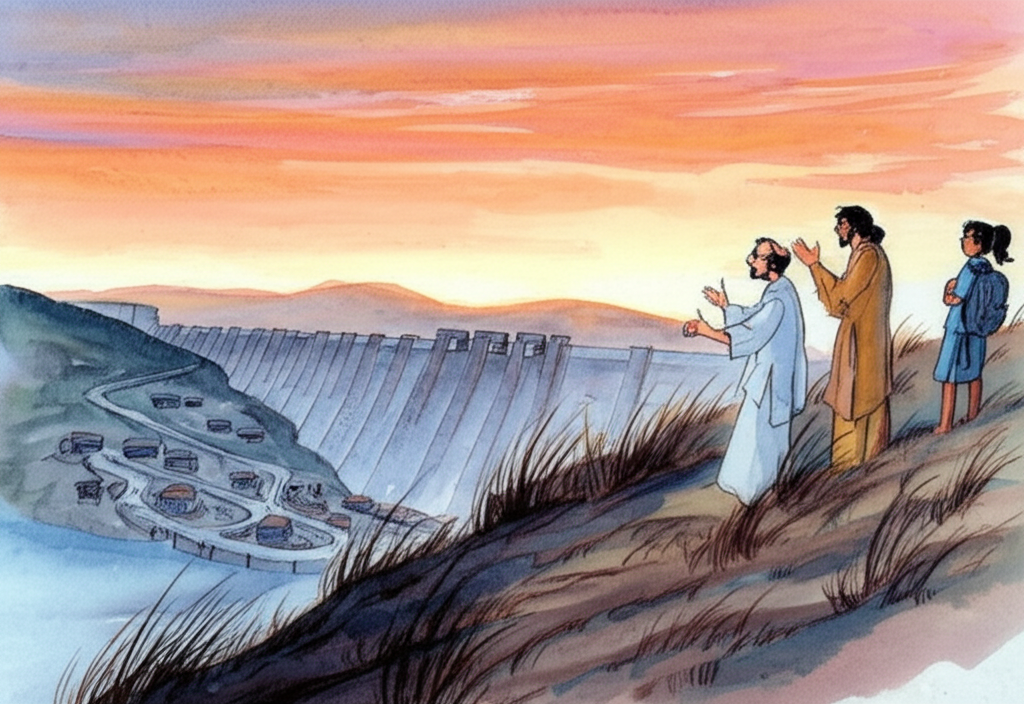
They walked through the colorful market, where people sold fruit next to people selling jewelry, and people sold everything from umbrellas to bracelets. Birds stole grain, monkeys stole bananas, and stray cows and dogs looked for food in the trash. Music was playing loudly, buses honked, and Sonu bought a whistle to add to the noise, but Miss Ramola told him to put it away. Bina had saved some money, and she used it to buy a headscarf for her mom.
As they were about to go into a restaurant for a meal, Prakash and his friends joined them, but Mr. Mani still wasn’t there.
‘He must have met a relative,’ said Prakash. ‘He has relatives everywhere.’
After eating rice and lentils, they walked through the market without seeing Mr. Mani. Finally, when they were about to give up, they saw him coming out of a side street, with a big sack over his shoulder.
‘Sir, where have you been?’ asked Prakash. ‘We’ve been looking for you everywhere.’
Mr. Mani looked happy.
‘Help me with this bag,’ he said.
‘You bought more potatoes, sir,’ said Prakash.
‘Not potatoes, boy. Flower bulbs!’
It was dark when they got back to Nauti. Mr. Mani didn’t want to leave his sack of flower bulbs, so he had to sit in the back of the truck with Prakash and most of the boys.
Bina didn’t feel sick on the way back. Going uphill was better than going downhill! But by the time the bus got to Nauti, it was too late for most of the kids to walk back to their villages. The boys stayed in different homes, and the girls were given beds in the school hallway.
The night was warm and still. Big moths flew around the lightbulb in the hallway. Sonu counted moths and fell asleep quickly. But Bina stayed awake, listening to the sounds of the night. An owl hooted in the forest. The call of a deer traveled up the valley from the stream. Jackals were howling. There seemed to be more than ever before.
Bina wasn’t the only one who heard the deer. The leopard, lying on a rock, heard it too. The leopard lifted its head and stood up. Deer were its natural food. But there weren’t many left, so the leopard was attacking dogs and cows near the villages.
As the cry of the deer sounded closer, the leopard left its lookout point and moved towards the stream.
In early June, the hills were dry and dusty, and forest fires started, destroying trees and killing animals. The trees burned quickly, and the wind carried sparks into the grass, so new fires started before the old ones went out.
Bina’s village wasn’t in the area where the trees burned, so the fires didn’t reach it. But Nauti was surrounded by a fire that lasted for three days, and the kids couldn’t go to school.
Then, at the end of June, the rain came, and the fires stopped. The rainy season lasted three months, and the mountains were covered in rain, mist, and clouds.
The first rain came while Bina, Prakash, and Sonu were walking home from school. The first few drops on the dusty path made them excited. Then the rain got heavier, and a wonderful smell came from the ground.
‘The best smell in the world!’ said Bina.
Everything came to life. The grass, the trees, the birds. Even the leaves looked new.
That first rainy weekend, Bina and Sonu helped their mom plant beans, corn, and cucumbers. Sometimes, when it rained hard, they had to run inside. Otherwise, they worked in the rain, with the mud sticking to their legs.
Prakash had a black dog that had one ear up and one ear down. The dog ran around getting in everyone’s way, barking at cows, goats, chickens, and people, without scaring anyone. Prakash said it was a very smart dog, but no one else thought so. Prakash also said it would protect the village from the leopard, but others said the dog would be the first to be eaten.
In Nauti, Tania Ramola was trying to find a dry spot in her room. It was an old building, and the roof was leaking. She had cups and buckets all over the floor to catch the water.
Mr. Mani had dug up all his potatoes and given them to the people who had given him lunches and dinners. He was having fun planting flower bulbs all over his garden.
‘I’ll have a field of flowers!’ he said. ‘Just wait until the end of August!’
‘Watch out for the porcupines,’ said his sister. ‘They eat flower bulbs too!’
Mr. Mani checked his ditch and made sure everything was okay. Prakash had done a good job.
Now, when the kids crossed the stream, the water was higher. Small streams had turned into waterfalls. Ferns had grown on the banks. Frogs were singing.
Prakash and his dog ran across the stream. Bina and Sonu followed carefully. The water was stronger now, and it almost reached their knees. Once they crossed the stream, they hurried along the path, hoping it wouldn’t start raining hard.
By the time they reached school, they each had leeches on their legs. They had to use salt to get them off. The leeches were the worst part of the rainy season. Even the leopard didn’t like them. It couldn’t lie in the grass without getting leeches on its paws and face.
One day, when Bina, Prakash, and Sonu were about to cross the stream, they heard a low rumble that got louder. Looking up at the hill, they saw trees shake, fall, and crash down. Earth and rocks fell down the mountain into the valley.
‘Landslide!’ shouted Sonu.
‘It’s taken away the path,’ said Bina. ‘Don’t go any further.’
There was a loud roar as more rocks, trees, and bushes fell. Prakash’s dog, who had run ahead, came running back. They stood still until the rocks stopped falling and the dust settled. Birds flew around, calling loudly. A scared deer ran past them.
‘We can’t go to school now,’ said Prakash. ‘There’s no way to get there.’
They turned and walked home through the mist.
In Koli, Prakash’s parents had heard the landslide. They were looking for the children when they saw them coming out of the mist, waving.
They couldn’t go to school for three more days, and Bina worried that they wouldn’t be able to take their final exams. Prakash didn’t care about missing exams, but he didn’t like feeling helpless. So he explored the hillside until he found a path going around the mountain. It joined another path near Nauti. This made their walk a mile longer, but Bina didn’t mind. It was cooler now that it was raining.
The only problem with the new path was that it went close to the leopard’s home. The animal had made this area its own since it had to leave the dam area.
One day, Prakash’s dog ran ahead of them, barking. Then he ran back, crying. ‘He’s always running away from something,’ said Sonu. But a minute later, he knew why the dog was scared.
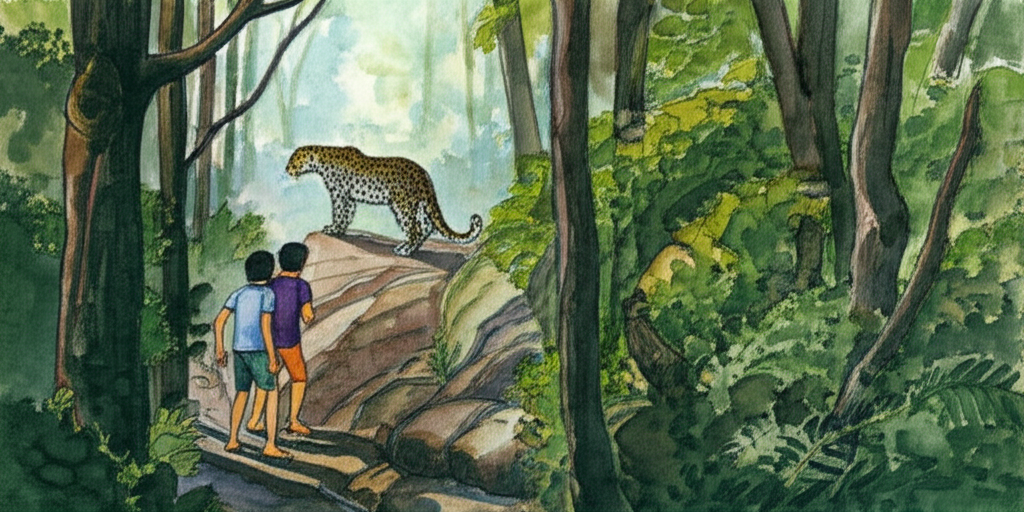
They walked around a turn and saw the leopard standing in their way. They were too scared to run. It was a strong animal. A low growl came from its throat. It looked like it was ready to attack.
They stood still, afraid to move or say anything. The leopard must have been surprised too. It stared at them for a few seconds, then jumped across the path and into the forest.
Sonu was shaking. Bina could hear her heart beating fast. Prakash said, ‘Did you see how it jumped? It was beautiful!’
He forgot to look at his watch for the rest of the day.
A few days later, Sonu pointed to a rock on the next hill.
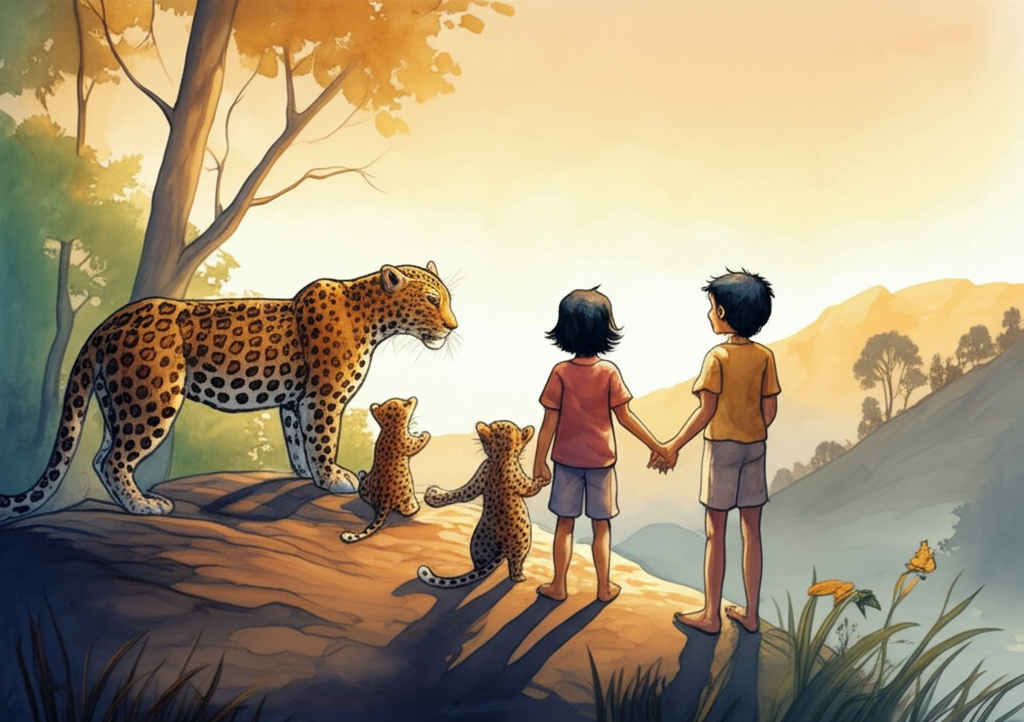
The leopard was standing there, looking strong and proud. Next to it were two young cubs.
‘Look at those little ones!’ said Sonu.
‘So it’s a mom, not a dad,’ said Prakash.
‘That’s why she was killing so often,’ said Bina. ‘She had to feed her cubs too.’
They stood still for a few minutes, looking at the leopard and her cubs. The leopard family didn’t notice them.
‘She knows we’re here,’ said Prakash, ‘but she doesn’t care. She knows we won’t hurt them.’
‘We’re like cubs too!’ said Sonu.
‘Yes,’ said Bina. ‘And there’s enough space for all of us. Even when the dam is ready, there will still be room for leopards and humans.’
The school exams were over. The rains were almost over too. The landslide had been cleared, and Bina, Prakash, and Sonu were crossing the stream again.
It was chilly because it was the end of September.
Prakash had learned to play the flute well, and he played on the way to school and on the way home. Because of that, he didn’t look at his watch as much.
One morning, they saw a small crowd in front of Mr. Mani’s house.
‘What happened?’ wondered Bina. ‘I hope he hasn’t gotten lost again.’
‘Maybe he’s sick,’ said Sonu.
‘Maybe it’s the porcupines,’ said Prakash.
But it wasn’t any of those things.
Mr. Mani’s first flower had bloomed, and everyone had come to see it! It was a huge red flower, so heavy that it had to be held up with sticks. No one had ever seen such a beautiful flower!
Mr. Mani was happy. And he got even happier as more and more flowers bloomed – red, yellow, purple, white. Mr. Mani had them all! One flower even showed up on Tania Romola’s desk – he liked her now – and another brightened up the principal’s office.
A week later, on their way home – it was almost the last day of school – Bina, Prakash, and Sonu talked about what they wanted to be when they grew up.
‘I think I’ll be a teacher,’ said Bina. ‘I’ll teach kids about animals and birds, and trees and flowers.’
‘Better than math!’ said Prakash.
‘I’ll be a pilot,’ said Sonu. ‘I want to fly a plane like Miss Ramola’s brother.’
‘And what about you, Prakash?’ asked Bina.
Prakash smiled and said, ‘Maybe I’ll be a flute player,’ and he played a sweet song.
‘Well, the world needs flute players too,’ said Bina, as they walked along.
The leopard had been following a deer. She stopped when she heard the flute and the voices of the children. Her own young ones were growing quickly, but the girl and the two boys didn’t look much older.
They started singing their favorite song again.
Five more miles to go! We climb through rain and snow. A river to cross… A mountain to pass… Now we’ve four more miles to go!
The leopard waited until they had passed before following the deer.